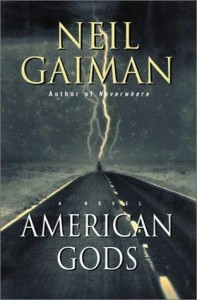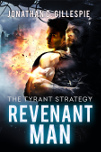Review: American Gods, by Neil Gaiman
September 13, 2012 in General Topics
 Depending on your outlook about the subject matter, American Gods, by Neil Gaiman, is either remarkably imagined, impossibly bleak, or a combination of those two extremes. Gaiman himself poses no easy answers to the questions of faith and the supernatural world, having written a novel that could be seen as the inverse of Stephen King’s The Stand.
Depending on your outlook about the subject matter, American Gods, by Neil Gaiman, is either remarkably imagined, impossibly bleak, or a combination of those two extremes. Gaiman himself poses no easy answers to the questions of faith and the supernatural world, having written a novel that could be seen as the inverse of Stephen King’s The Stand.
King’s work portrayed dueling forces drawing opposed factions of humanity to their banners in the ultimate battle between good and evil–a conflict to decide the fate of mankind. Even one of King’s central baddies, Randal Flagg, had a lastname appropriate to his purpose. Gaiman provides the opposite scenario: here, his powers could fight a savage war amongst themselves, and it’s strongly implied that not only would the average human be unaffected, they wouldn’t even notice. And his protagonist, known only as Shadow, could also be seen as a man with a name apropos to his role.
(Warning: Minor spoilers lie ahead.)
American Gods is a big book, tipping the scales at 624 pages, making it truly epic-length. It demands attention and requires it, in my opinion, if one hopes to enjoy its long, unbroken segments of backstory and narrative–segments that could have easily been pulled out and published as separate short fiction pieces in the pages of various anthologies. This is a sprawling work, whose tale unfolds over much of the United States, and it is every bit as vast and diverse in its composition and components as our nation is in its states and communities.
Shadow is a troubled man that I took an instant liking to. He starts the story as an inmate awaiting release after a few years of hard time. He’s looking forward to getting home to darling wife Laura, whom he adores. He even has a job waiting for him on the outside. Shadow has bided his time reading just about anything he could get his hands on, and has taken up coin tricks–a hobby that serves as one of the book’s many sources of metaphor and allegory.
Bad news arrives on swift wings, and a stranger with an uncomfortable level of knowledge about Shadow’s activities follows soon after. Every carefully-guarded hope and treasured plan Shadow has constructed, or held on to, uncoils like rotten rope, leaving him a man without any sense of purpose. This is soon resolved, in some sense, by the arrival of a new job that our ex-con embraces half-heartedly, because he doesn’t see any other options, and feels like a dead man walking anyway. Shadow’s angst and its resolution is one of the book’s supporting plots.
Having set the stage, Gaiman begins fleshing out the world “behind” it, and its inhabitants, Gods established in the U.S. by the beliefs of immigrants, explorers, and native peoples. And this is where I found myself taking issue with the book’s pacing.
While it is true that our friends across the pond seem to plot at a more relaxed rhythm, and that’s fine (given the American obsession with every trade paperback earning the accolade of “rollercoaster ride”), the impression I had reading Gaiman’s novel was that he’d spent oodles of time criss-crossing our country, and felt compelled to include every last detail and nuance he observed. This is a book with a lot of driving. And a lot of walking. And long tracts of descriptive prose–about equally long tracts of American countryside. Minor characters are sometimes mentioned once, and never fleshed-out, or mentioned once and then somewhat neglected. Over the course of the book’s length, Shadow sees so many faces that Gaiman sometimes repeats literary tropes in introducing them. That’s a nit the average reader won’t notice, but it’s there.
A linear book, this is not. Big chunks of text are given over to expositive backstories, in the guise of a book being written by one of Gaiman’s characters. While these are often nicely-done and fascinating, the heartless editor in me knows some of them could have been cut without any damage to the novel’s plot resolution. However, these passages enrich the book’s soul.
Gaiman teases us through the entire novel with hints at a coming conflict to shake the heavens. When we arrive at the endgame for all that ramping-up of hostility, we find there for us a final struggle resolving over the span of just a few pages. You can’t go into this book expecting the climactic battle of a God’s Demon, for example. You’re just not going to get a throwdown with sparks and thunderclaps.
So, action junkies and sword-and-sorcery fans…this might not be not your book. Those of you willing to enjoy a novel dripping with ambience, that takes its own time wrapping plots, subplots and subtext around itself — and resolves most of them with aplomb — this one’s for you.
The history geek in me loved it, too, because of its sprinklings of alternate history. I give additional bonus points for all the Egyptian and Norse references.
Ultimately, while I was aware of my areas of contention with the novel’s structure, I always looked forward to cracking the page. This supplicant was well-rewarded by one of the masters of modern fiction. And man, is this novel thought-provoking.
This is a deep book, man. Read it.
4/5 stars.
There was more I wanted to say about the novel, but I didn’t think it really belonged in a review. So for those of you wanting just the review, here’s where you can stop.
Gaiman’s book provides many challenges to those of faith. I am challenging you to read a Christian’s take on the subject matter. So if you’re interested, keep reading, with my thanks.
Behind the Stage
Every author will tell you that there are parts of them that make it to written characters, and that was certainly the case with American Gods. There have got to be pieces of Gaiman all over this book, and that’s terrific, because a good writer loses themselves in their characters. Gaiman is a great writer.
I don’t know if the man is an atheist, agnostic, or something else. I would imagine he is, but I don’t reject friendships on the basis of belief (or lack thereof), and I generally read along the same stance. No matter Gaiman’s thoughts on this most basic of human questions, the novel relies on a central premise that, in some ways, echos a growing school of thought. And that philosophy holds that all religions are human artifacts, propped up only by belief, and thus universally identical, universally false, and not worth further examination for their individual value.
This is a point I am compelled to address.
Even if one believes that religions are constructs established by culture, or some basic human tendency towards an explanation of the unknown, that doesn’t instantly place them all on the same footing. Aarguing that there is really no fundamental difference between Buddha or Shiva, between Christ and Xenu–or any other comparison one could derive–that all religions are fundamentally alike, and this aren’t worth examining closer, strikes me as something like saying federalism is fundamentally the same as communism, or Neo-Impressionism is the same as Op Art, or cars are the same thing as planes. All these things are human artifacts, but no one would argue that there aren’t vast differences across their strata and substrata. So why do so many lump all religions together, and cease examining those religions from that point?
Gaiman’s book is filled with imagination. If he is an atheist, then he’s managing what I really wish more people–on both sides of belief–would attempt: he demonstrates a healthy, welcome respect for points of view different from his own. The book seems to imply that we might not believe, not anymore, but these things are still part of us, and we them, and they have value. I appreciate that.
I spent a lot of time thinking about this book, and ultimately my conclusion was that I could have never written it, even despite having been an atheist myself at one point. So while I don’t agree with Gaiman’s fictional treatment of Christ (for example), stuff like this should be read by believers, as well. In a perfect world, we’d be able to ask big questions like this book does, without being at each other’s throats, and we’d be able to acknowledge that–while we might disagree–we would embrace and value all points of view, especially when they provide clarity to our own.
I think one of the most commendable qualities of Gaiman’s novel is that it challenges and encourages discussion on a subject that is as fundamental to mankind as DNA, but it does so with respect, even if I disagree with some of its implied stances.
And that’s pretty cool.
Stay tuned.

Recent Discussion